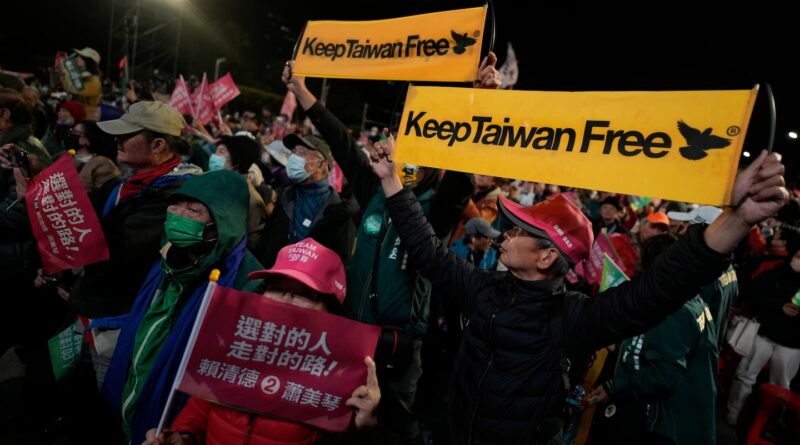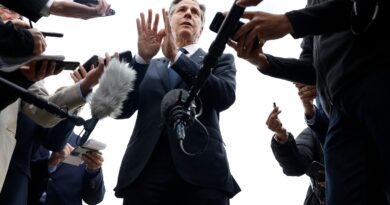Analysis | China looms over Taiwan’s fateful election
Ever since, Beijing has viewed Taiwan as part of its territory, though the island remained defiantly self-governing and its government later transitioned from a nationalist military dictatorship to a vibrant, multiparty democracy. Taiwan still styles itself as the Republic of China, tethered to a mainland its political elites fled but never forsook. In the early years of the new century, talk of warming relations and even potential reunification was rife. Ma, a KMT leader motivated by deepening economic partnerships with China, was keen on mending fences with the mainland.
“What confronts us is the need to use understanding to get rid of conflict and to look forward to prosperity,” Ma said at the summit. “We need to announce to the world that we want to consolidate ties across the strait.”
Xi was almost poetic. “There’s no force that can separate us, because we are brothers who are still connected by our flesh even if our bones are broken,” he said. “We are a family — blood is thicker than water. Today we are sitting together so that our tragic history won’t repeat itself.”
Far from being a harbinger of things to come, that meeting seems a snapshot of a vanished era. In the years since, Xi has led China down an all-the-more ruthless, authoritarian path, tightening his grip on power while quashing the political freedoms of semiautonomous Hong Kong. His rhetoric toward Taiwan has been far from cuddly — in speeches, he casts unification with the mainland as an inevitability that could take place through force of arms, if need be.
Ma, meanwhile, is a diminished figure. His party has been out of power for the past eight years, sidelined by the rival Democratic Progressive Party, which is more hostile toward Beijing and wary of falling beneath its umbrella. On the eve of a major national election in Taiwan, Ma was reportedly disinvited to the final major election rally of KMT presidential candidate Hou Yu-ih, after stoking controversy via media appearances during which he held open the door for unification with China and suggested Taiwanese voters should trust Xi on cross-strait relations.
Ma’s comments were unwelcome for a KMT presidential candidate eager to dispel the widely held view that their party is China’s favored faction in Taiwan. “The timing is very unfortunate for the Hou campaign,” Ma Chun-wei of Tamkang University in Taipei told Singapore’s Straits Times. “If Ma had said what he said two months ago, people might have moved on from it by now. But to say these things just a few days before the election will likely cost the party crucial median voters.”
As it is, Hou is facing an uphill battle against the DPP’s candidate, Lai Ching-te, as well as an upstart third-party challenge from Ko Wen-je of the center-left Taiwan People’s Party. Domestic concerns weigh heavily on the ballot, but China remains the elephant in the room at a time when polls show an increasing desire for separation from China among ordinary Taiwanese and a stronger embrace of a distinct Taiwanese identity.
Xi’s coercive measures and saber rattling have contributed to the hardening rift. “This election cannot change the basic fact that, if unification were a company, it would have lost its market and would be on the brink of insolvency,” wrote David Sacks of the Council on Foreign Relations. “Taiwan is dedicated to continuing to embed itself in the West, a process that is inimical to China’s interests.”
The presidential candidates are not seeking to rock the boat. They favor the maintenance of the delicate status quo that defines Taiwan’s relationship with China and the world. But the candidates differ on how to preserve Taiwan’s standing as a democratic state that, while unrecognized by the vast majority of the international community, is still wholly free from Beijing.
“In particular, do deep cross-strait economic ties and business links protect Taiwan from Chinese aggression, or make it more vulnerable?” my colleague Meaghan Tobin explained. “Hou and the KMT say that keeping up business links across the strait is the key to holding off Beijing, while Lai and the DPP are convinced that’s a slippery slope toward integration with China on every level.”
Chinese officials have branded Lai a “destroyer of peace” and sent strong signals that another DPP term in power heightens the prospect of escalation. Meanwhile, in Washington, lawmakers are rallying around Taiwan more than ever before.
“Taiwan stands as a vibrant democracy and a shining beacon of freedom and the rule of law in the Indo-Pacific,” Rep. Ami Bera (D-Calif.) said in an email. “The United States remains steadfast in support of the people of Taiwan and our shared commitment to democratic values and the rule of law.”
Beijing, though, sees this glowing rhetoric and deepening U.S. engagement with Taiwan as part of a greater threat.
“No Communist leader is likely to be generous with Taiwan’s democracy, any more than Taipei’s leadership is likely to trust Beijing to allow the island’s society to flourish as it does today,” the Atlantic’s Michael Schuman wrote. “The Communist Party has all too clearly shown its intentions toward liberal societies. Thus, the more democracy entrenches itself in Taiwan, the more intractable the cross-strait conflict becomes, and the more urgently Washington must prepare for the worst.”



